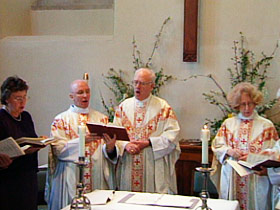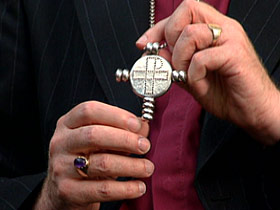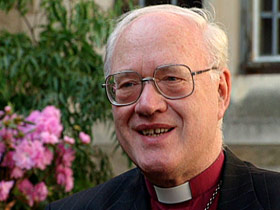The Archbishop of Canterbury
BOB ABERNETHY, host: The Archbishop of Canterbury, George Carey, was in Washington this week giving a lecture at the College of Preachers at the National Cathedral. The subject was Jewish-Christian relations. Dr. Carey also called on President Bush and helped officiate at a worship service.
Dr. Carey leads the world’s 63 million Anglicans, more than two million of them American Episcopalians.
He is an evangelical who believes Christians should try to convert others so they can be saved. But should that be done with Jews, who already have their own covenant with God? If so, how?
The complexity of that was clear when the Archbishop and I sat down to talk.

DR. GEORGE CAREY (Archbishop of Canterbury): I believe that every Christian has a duty, an obligation, to share his or her faith with others. What I’m very concerned about is the character of our witness, our sharing with [our] Jewish brothers and sisters. The character of our witness must be gentle, must be loving, must be understanding of what we owe to Judaism.
I would personally, normally, never take the first step, but I would wait for my Jewish friend to ask about the Christian faith. Then I would feel it would be right to share that faith with him.
ABERNETHY: But not to actively try to convert that person?
DR. CAREY: That is not my style, of course, but because I love my faith, I love my Lord, I want to share him with others. I would wait for opportunities when I can do that in the most appropriate way.
ABERNETHY: Archbishop, do you think salvation is available to Jews?
DR. CAREY: Salvation is given to us, I believe, through Jesus Christ, and that is why he said go into the world and preach the gospel, to share it with others. So that is available to everybody. The burden of my contention is that I believe that God has already a relationship with the Jewish people, so, therefore, it’s much more complex in the case of the Jews.

ABERNETHY: Do you feel that unless Jews convert to Christianity they can not be saved?
DR. CAREY: No. I would not want to say that. We must approach it from a viewpoint of a cross, which for me is not a symbol of power — this cross is not a symbol of power, it’s a symbol of service, of suffering. And therefore is an invitation to Jews and everyone to consider the claims of Jesus Christ for yourself. And let’s walk together on a journey to serving other people in our world today.
And if you want to follow him as Jesus of Nazareth, then no one will be more delighted than I. But I want to respect that I’ve got a lot to learn from you as well.
ABERNETHY: The Holocaust shattered the faith of many Jews. What do you say to Holocaust survivors and others who can not understand how a just God could have permitted the genocide?
DR. CAREY: I think that is the most awful, haunting question of all, of what theologians call theodicy. How can we account for God’s silence during the Holocaust? From a Christian point of view, there is something about the cross, which tells me what God is like, and that is He suffers with us. He was there in the Holocaust.
ABERNETHY: There has been so much anti-Semitism over the centuries. The charge commonly was that Jews killed Christ. What do you say about that?

DR. CAREY: The first Christians all too easily assumed it was the Jewish race that put Jesus to death. I think that’s a bizarre interpretation. For me, it’s the human race, it was not the Jews who did that, it was us.
ABERNETHY: Would it be fair to say that we have irreconcilable differences over the question of who Jesus was?
DR. CAREY: Yes.
ABERNETHY: But we have so much in common, we just need to get on with things and do what we can together?
DR. CAREY: The person of Jesus Christ is the very heart of it. I regard Jesus Christ as the way to the Father. As the human face of God. And the Jew would look at that person differently. The Jew may well respect Jesus as a faithful Jew even. But I don’t think we need to actually say there are irreconcilable differences, and we walk away from one another. Let’s see how far we can travel together, walk together, understand one another better, and share a responsibility for the world in which we live.
ABERNETHY: Archbishop, as you look at the broad trends in the world, how do you think the tide is running between a religious view of the world and secularism?
DR. CAREY: I’m quite worried about the state of our world. I think [in] the Western world, particularly, we’ve gone far more for lifestyle and less for life substance. There is so much brokenness, broken relationships; substance of life and what really makes for good living — of justice and peace and holiness of life — these things are seen to be rather contemptible.
And I think the religious way of looking at things has still a vital role to play in our society. Therefore, our churches must recover their vigor in proclaiming a clear faith for people today. But not a simplistic faith, a faith actually that can be intellectually satisfying as well.
ABERNETHY: Last week, Dr. Carey celebrated his 10th anniversary as Archbishop of Canterbury.

